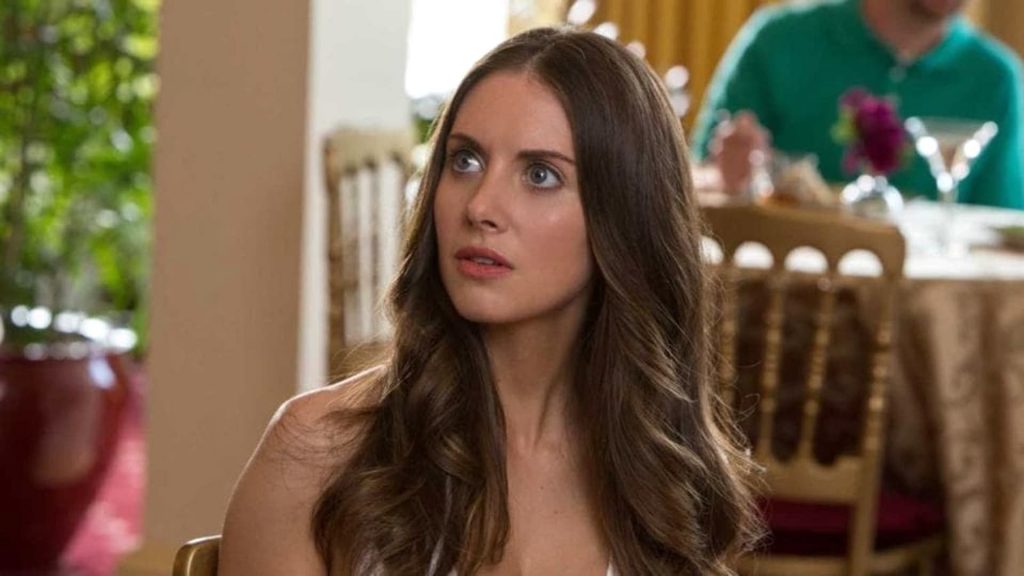When writer/director Jeff Baena (Horse Girl, The Little Hours) returned home from a shoot in Italy and came across a quirky story of professional misrepresentation, he saw more than someone’s frustration at a major career letdown. He saw his next project.
Spin Me Round stars Alison Brie, Alessandro Nivola, Aubrey Plaza and Molly Shannon and was directed by Baena, co-written by Baena and Brie. Frequent collaborators, this time around, they tell the story of a restaurant manager who is selected to participate in her employer’s summer training program in Italy. A dream come true which soon devolves into a bizarre nightmare.
Since his screenwriting debut of 2004’s I Heart Huckabees, Baena has fine-tuned his process, worked in improvisation, and developed his preferred method of outline over screenplay. We spoke about how the pandemic forced him to tweak this process, what he values in a story and who he learned from during the early days of his career.
Tell me about the origins of Spin Me Round. What stood out for you and what kind of opportunities did you see in this real-life story to want to turn it into a feature film?
After I shot The Little Hours and came back to America from Italy, I read this article about an Italian franchise restaurant in America that has a program where they send their top managers to their institute in Italy. This one manager went there and was expecting this sort of life-changing experience… and the villa that was on the website for this program ended up just being a kind of background. They ended up staying in this dorm that was falling apart and the program was not very well organized.

Jeff Baena
After the head chef made them a bolognese, there really wasn’t more to do and they kind of felt like they were prisoners there for the remainder of the week. They didn’t really go anywhere and so this person in the article was railing against it. I thought that was a really funny setup and so I kind of just took that as a jumping off point. From there I did a reduction ad absurdum of how bad it could be based off of that as the jumping off point.
Tell me about your writing dynamic with Alison Brie and how you work together.
I started writing this as an outline back in 2016 and then kind of put it aside as other things were coming up… and she came to me with this idea that ended up being Horse Girl. I had an idea that we kind of “mixed” together.
My last three movies were based off of outlines and not actual screenplays; so they were they were 28 to 30-page outlines where I would write down all the actions of what was happening. And then I would summarize the gist of what the characters were saying without actually spelling it out.
I really like working that way, and so initially this started off as an outline. And Horse Girl, the last movie that we had done together, was also an outline. We shot it as an outline. She would come over and we would just write together. We would each have a computer and use Final Draft and would use the function where we could share a screen and run at the same time… and just sort of talk it out.
On this one I basically had like a 14 or 15-page outline that I’d shared with her after we did Horse Girl. I asked her to check it out and she loved it, so we fleshed it out as an outline.
We were intending to shoot this the summer of 2020 and then COVID hit. So we decided to just write it out as an actual screenplay instead. For one thing, we had the time and, B, because I think it’s easier for people to finance a script than it is an outline. People are a little bit shyer about that. So it ended up working out because we didn’t have a lot of time to shoot this movie. It was a bit of a time crunch, and so having the script was a benefit. Instead of having the time to explore and work out the ideas, we really just had to commit. That was the structure of how it worked out.
You’ve had experience with improv; has that helped with some of those tight film schedules and do you enjoy working with that type of flexibility?
Yeah, I do. I think I do like problem solving. I mean, in an ideal world everything would be easy, but filmmaking is not easy. It’s very hard, and so I think having that ability to pivot and find solutions, not just in terms of logistics, but in terms of actual story and narrative has been really beneficial.
We didn’t do a lot of improvisation on this movie. There were a couple of bits but it was pretty limited compared to my other movies and the way that I would normally do improvisation. My other movies are, more than anything, focused on the dialogue. I would tell the actors what they’re saying, what their goal is in the scene, and the gist of where they’re going. But what I value is the authenticity of the performance, and so I found that by letting the actors collaborate in terms of what they’re seeing, you end up having something that sounds a little bit more natural for them than forced.
We didn’t have the benefit of that with this one, but we did have the benefit of having extra time to consider all of those factors. So when we wrote the script out, knowing the cast that we had, we generally would tailor the dialogue and the character for the actor after we cast them. There would be adjustments made to the script itself, instead of imposing something on the actors, which I felt might have been more of a stretch.
Some of these characters were written for specific actors and ones that you’ve worked with before; and others, as you said, were more generic and then fine-tuned after casting. Do you have a preference when writing a character?
I don’t know, it’s interesting. I mean, obviously I think having as much control over things as possible is great. But you can’t ever have control over anything, and things always go haywire. So it is kind of fun to me to write for someone only to have to cast somebody else and then have to make that adjustment. It just makes it feel more fresh and alive; I’m always drawn to novelty and to things feeling a little bit more dynamic than staid. So dealing with those complications and obstructions could be somewhat exhilarating because it forces you to reconsider things; and it enlivens the project from just being something that you’ve been working on for a couple years.

Alison Brie
I think that’s why I’m drawn to improvisation – because that level of the unexpected is something I value and I think that level of engagement means you’re focused on it instead of just sleepwalking through something. It forces you to consider everything in every moment and you have to be present as opposed to just sort of phoning it in.
Tell me about writing a “comedy thriller” and combining humor with mystery.
I think I’m drawn to irony a lot… and I think comedy is sort of driven by incongruity. And I think I’m sensitive to that. It’s just something that I value. I’m not really drawn to melodrama because I feel like they’re so oppressive in the world that they’re creating. Because I personally I feel like, in the most serious moments, there is still comedy and the way people cope with bad things is generally through comedy.
So I think comedy tends to have worlds built within it, whereas dramas tend to sort of subordinate everything else and condense things into this one feeling. I’d like things to be a little bit more expansive.
I don’t really think about genre as much, I just sort of think about the characters and what feels good in the moment. But you saying that… I don’t know. I love the movie Manhattan Murder Mystery; it’s amazing and it’s hysterical. And it’s sort of employing some of the tropes seen in thrillers, but there’s an irony to it; and ultimately, you’re watching the subversion of that genre, because the characters are in the forefront. So you’re watching their version of it and it’s a failure in terms of efficiency. All the problems that are happening are because of who they are. And I think I’m probably drawn to that sort of primacy of the characters over the plot.
Early on in your career you worked with people like Robert Zemeckis and David O. Russell. What were some of your professional takeaways from those relationships, particularly from your collaboration with Russell on I Heart Huckabees?
Robert Zemeckis is an extremely kind person. He’s worked his way up to a point where whatever he dreams, he could make real – and I think that’s incredible.
I got to work with him on What Lies Beneath and on Cast Away. Just watching the sets that he had and the benefit he had of being able to envision the scene… I remember his producer, Steve Starkey, would tell me that Zemeckis would have an idea, like having the camera go through a car and zoom around and pop up and so on… and then it would be Starkey’s job to figure out how to chainsaw the car into pieces to be able to move the camera through it! I mean, hopefully someday I have that level of filmmaking ability where I’m able to just envision something and then build it. At this point, with independent filmmaking, you have to be a little bit more savvy and come up with more tricks; but just his unbridled imagination… Then being put to film was something that was super inspirational.
With David, I think the things I learned were more on the writing side of the world. I think what he’s really good at is taking a bunch of characters, clearly delineating each one of them, and then throwing them together and watching those conflicts interact. I’m drawn to that. I’m drawn to ensemble movies and I love how every character feels distinct and you’re able to track where they’re coming from and where they’re going… and then watch the ripples amongst themselves play out without feeling like the plot is as important as those interactions.
David has a facility with writing when it comes to writing memorable, distinct characters in large groups, so that probably helped me out big time.

